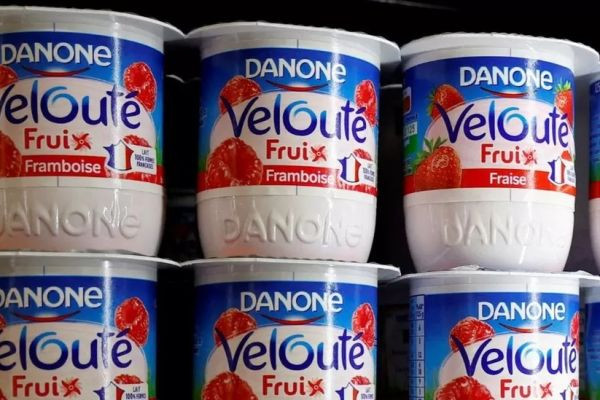Danone and Carlsberg's and yogurt maker Danone's respective Russian companies are now under Russian ownership.
In a recent directive, Russian President Vladimir Putin placed the units under "temporary management" of the state.
Earlier this year, Moscow passed regulations enabling it to confiscate the assets of businesses from "unfriendly" nations.
Following Russia's invasion of Ukraine, several businesses in Russia stopped operating. Carlsberg and Danone were in the midst of selling their operations in Russia.
The order from last Sunday gives the Russian real estate agency Rosimushchestvo jurisdiction over the shares of Carlsberg and Danone Russia-owned Baltika Breweries.

Danone, a French company, stated that it was "currently investigating the situation" after beginning the process to sell its Russian business in October.
The company continued by stating that it was "getting ready to take all necessary measures to protect its rights as a shareholder of Danone Russia, and the continuity of the business' operations."
According to Carlsberg, it had not received "any official information from the Russian authorities regarding the presidential decree of the consequences for Baltika Breweries".
The Danish brewer added that the "extensive process" to separate the Russian division from the rest of the business had been finished. The business signed a contract to sell Baltika Breweries last month, but the transaction has not yet been finalized.
The prospects for this sales procedure are now extremely uncertain as a result of the presidential proclamation," it continued.
In reaction to the US and other nations' alleged "unfriendly" and "contrary to international law" activities, Mr. Putin issued an order in April empowering Russia to temporarily seize foreign assets.
Additionally, in April, it was revealed that two energy businesses, Uniper of Germany and Fortum of Finland, had their Russian subsidiaries placed under state supervision.
The largest dairy company in Russia is Danone, which employs about 8,000 people there.
An estimated €1 billion ($1.1 billion; £860 million) loss for Danone would follow from the sale of the company. Baltika, a Carlsberg subsidiary, employs 8,400 people across eight facilities to make some of the most famous beer brands in Russia, according to the Carlsberg website.
Implications for Carlsberg and Danone
The acquisition of Carlsberg and Danone by Russian entities carries significant implications for both companies. While the specific details and terms of the takeovers remain undisclosed, it is expected that the new ownership will bring about substantial changes in management, corporate strategies, and operational practices.
For Carlsberg and Danone, this shift in ownership may provide opportunities for increased market penetration and expansion within Russia. However, it also introduces the need to navigate a potentially different business environment, including changes in regulatory frameworks, cultural nuances, and consumer preferences. The success of these companies under Russian ownership will depend on their ability to adapt and leverage the new resources and support provided by their Russian counterparts.
Russian Economic Influence Expands
The takeovers of Carlsberg and Danone reflect Russia's growing economic influence on the global stage. By acquiring established multinational corporations, Russia seeks to assert its dominance in strategic sectors and reduce dependency on foreign companies. These developments align with the country's broader vision of economic diversification, technological advancement, and self-sufficiency.
Furthermore, the takeovers send a clear message to other international businesses operating in Russia and beyond. The move signals Russia's openness to business opportunities, its desire for increased control over key sectors, and its willingness to invest in long-term growth and development.
Conclusion
The takeover of Carlsberg and Danone by Russian entities marks a significant milestone in Russia's pursuit of economic expansion and influence. By acquiring these renowned multinational corporations, Russia aims to strengthen its presence in the global beverage and food industries while diversifying its business portfolio. The implications for Carlsberg and Danone remain to be seen, as they navigate the transition under new ownership. As Russia's economic influence continues to expand, it is likely that we will witness further strategic acquisitions and investments by the country in the coming years, shaping the global business landscape in unexpected ways.
 Bitcoin: $97594.78 1.34%
Bitcoin: $97594.78 1.34%  Ethereum: $3403.90 2.85%
Ethereum: $3403.90 2.85%  Tether: $1.00 0.1%
Tether: $1.00 0.1%  Solana: $255.64 0.36%
Solana: $255.64 0.36%  BNB: $651.68 4.38%
BNB: $651.68 4.38%  XRP: $1.44 1.64%
XRP: $1.44 1.64%  Dogecoin: $0.42 2.99%
Dogecoin: $0.42 2.99%  USDC: $1.00 0.03%
USDC: $1.00 0.03%  Cardano: $1.03 7.55%
Cardano: $1.03 7.55%  Lido Staked ETH: $3387.29 2.41%
Lido Staked ETH: $3387.29 2.41%  TRON: $0.21 6.63%
TRON: $0.21 6.63%  Avalanche: $41.58 5.37%
Avalanche: $41.58 5.37%  Shiba Inu: $0.00 1.9%
Shiba Inu: $0.00 1.9%  Stellar: $0.50 66.86%
Stellar: $0.50 66.86%  Wrapped Bitcoin: $97458.31 1.22%
Wrapped Bitcoin: $97458.31 1.22%  Polkadot: $8.44 33.81%
Polkadot: $8.44 33.81%  Chainlink: $17.43 11.43%
Chainlink: $17.43 11.43%  Bitcoin Cash: $504.22 3.26%
Bitcoin Cash: $504.22 3.26%  UNUS SED LEO: $8.61 1.48%
UNUS SED LEO: $8.61 1.48%  NEAR Protocol: $6.10 7.6%
NEAR Protocol: $6.10 7.6%  Litecoin: $97.81 8.37%
Litecoin: $97.81 8.37%  Uniswap: $10.82 14.14%
Uniswap: $10.82 14.14%  Multi Collateral DAI: $1.00 0.01%
Multi Collateral DAI: $1.00 0.01%  Internet Computer: $11.21 10.77%
Internet Computer: $11.21 10.77%  Crypto.com Coin: $0.19 2.85%
Crypto.com Coin: $0.19 2.85%  Sp8de: $0.59 12.85%
Sp8de: $0.59 12.85%  Ethereum Classic: $29.43 5.16%
Ethereum Classic: $29.43 5.16%  Artificial Superintelligence Alliance: $1.36 9.84%
Artificial Superintelligence Alliance: $1.36 9.84%  VeChain: $0.04 26.86%
VeChain: $0.04 26.86%  Filecoin: $5.33 12.33%
Filecoin: $5.33 12.33%  Stacks: $2.06 5.11%
Stacks: $2.06 5.11%  OKB: $50.53 9.73%
OKB: $50.53 9.73%  Monero: $160.02 0.74%
Monero: $160.02 0.74%  Aave: $175.20 5.98%
Aave: $175.20 5.98%  Algorand: $0.30 22.81%
Algorand: $0.30 22.81%  Fantom: $0.86 19.78%
Fantom: $0.86 19.78%  The Graph: $0.24 11.01%
The Graph: $0.24 11.01%  Hedera Hashgraph: $0.15 10.01%
Hedera Hashgraph: $0.15 10.01%  Cosmos: $8.13 10.9%
Cosmos: $8.13 10.9%  Injective: $27.60 12.72%
Injective: $27.60 12.72%  THORChain: $5.59 5.47%
THORChain: $5.59 5.47%  THETA: $1.88 11.49%
THETA: $1.88 11.49%  MANTRA DAO: $3.61 1.4%
MANTRA DAO: $3.61 1.4%  Raydium: $5.95 1.62%
Raydium: $5.95 1.62%  Maker: $1638.51 0.02%
Maker: $1638.51 0.02%  Arweave: $21.88 24.12%
Arweave: $21.88 24.12%  Bitcoin SV: $70.49 4.35%
Bitcoin SV: $70.49 4.35%  KuCoin Token: $11.44 3.04%
KuCoin Token: $11.44 3.04%  Polygon: $0.57 21.23%
Polygon: $0.57 21.23%  Flow: $0.82 13.98%
Flow: $0.82 13.98%  Quant: $100.47 16.91%
Quant: $100.47 16.91%  Lido DAO: $1.34 8.55%
Lido DAO: $1.34 8.55%  Gala: $0.03 14.21%
Gala: $0.03 14.21%  EOS: $0.76 6.59%
EOS: $0.76 6.59%  Tezos: $1.13 2.43%
Tezos: $1.13 2.43%  Axie Infinity: $6.61 11.84%
Axie Infinity: $6.61 11.84%  Neo: $14.40 8.09%
Neo: $14.40 8.09%  Helium: $5.77 6.11%
Helium: $5.77 6.11%  The Sandbox: $0.41 14.35%
The Sandbox: $0.41 14.35%  Decentraland: $0.50 17.46%
Decentraland: $0.50 17.46%  GateToken: $10.98 8.29%
GateToken: $10.98 8.29%  Akash Network: $3.89 3.75%
Akash Network: $3.89 3.75%  AIOZ Network: $0.81 11.46%
AIOZ Network: $0.81 11.46%  eCash: $0.00 2.24%
eCash: $0.00 2.24%  Nexo: $1.35 3.52%
Nexo: $1.35 3.52%  Pendle: $5.27 4.67%
Pendle: $5.27 4.67%  MultiversX: $35.30 16.45%
MultiversX: $35.30 16.45%  Mina: $0.71 6.18%
Mina: $0.71 6.18%  FTX Token: $2.46 1.77%
FTX Token: $2.46 1.77%  Zcash: $47.62 5.16%
Zcash: $47.62 5.16%  Conflux: $0.17 9.29%
Conflux: $0.17 9.29%  Chiliz: $0.08 10.07%
Chiliz: $0.08 10.07%  IOTA: $0.22 17.96%
IOTA: $0.22 17.96%  Gnosis: $272.82 4.65%
Gnosis: $272.82 4.65%  Oasis: $0.09 13.02%
Oasis: $0.09 13.02%  XinFin Network: $0.05 16.26%
XinFin Network: $0.05 16.26%  SuperVerse: $1.31 6.3%
SuperVerse: $1.31 6.3%  PancakeSwap: $2.16 10.39%
PancakeSwap: $2.16 10.39%  Nervos Network: $0.01 5.8%
Nervos Network: $0.01 5.8%  Curve DAO Token: $0.50 12.31%
Curve DAO Token: $0.50 12.31%  Kusama: $38.48 77.64%
Kusama: $38.48 77.64%  Compound: $63.58 17.82%
Compound: $63.58 17.82%  Kava: $0.49 6.97%
Kava: $0.49 6.97%  TrueUSD: $1.00 0.07%
TrueUSD: $1.00 0.07%  NXM: $73.24 4.99%
NXM: $73.24 4.99%  Theta Fuel: $0.07 4.89%
Theta Fuel: $0.07 4.89%  DeXe: $8.22 1.19%
DeXe: $8.22 1.19%  1inch Network: $0.36 5.67%
1inch Network: $0.36 5.67%  Synthetix: $1.97 9.27%
Synthetix: $1.97 9.27%  Zilliqa: $0.02 13.95%
Zilliqa: $0.02 13.95%  WOO: $0.24 10.36%
WOO: $0.24 10.36%  Celo: $0.79 9.36%
Celo: $0.79 9.36%  Reserve Rights: $0.01 8.6%
Reserve Rights: $0.01 8.6%  Trust Wallet Token: $1.00 4.37%
Trust Wallet Token: $1.00 4.37%  Livepeer: $11.56 10.22%
Livepeer: $11.56 10.22%  IoTeX: $0.04 3.53%
IoTeX: $0.04 3.53%  Amp: $0.01 7.62%
Amp: $0.01 7.62%  Enjin Coin: $0.23 13.17%
Enjin Coin: $0.23 13.17%  Holo: $0.00 9.12%
Holo: $0.00 9.12%  Dash: $32.85 11.55%
Dash: $32.85 11.55% 








